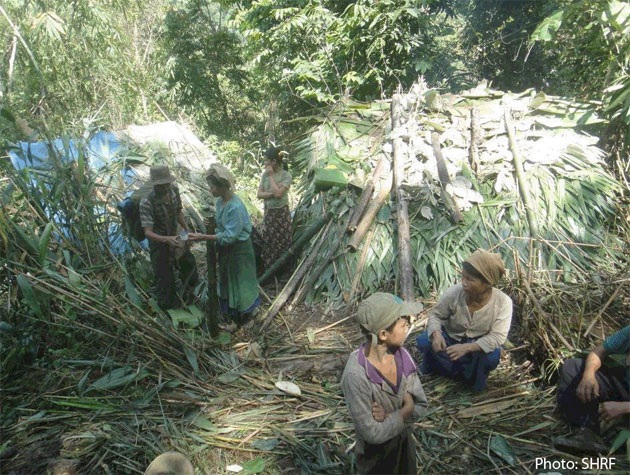Chiang Mai (Mizzima) – Because of five months of fighting between the Shan State Army-North (SSA-N) and Burmese government troops, more than 30,000 people have fled the combat area. Many face serious shortages of food and medicine, according to a joint statement released on Wednesday by Shan social organizations.
The statement released by the Thailand-based Shan Women’s Action Network (SWAN) and Shan Human Rights Foundation (SHRF) said more than 31,700 people from villages in nine townships: Mong Hsu, Mong Yai, Kyethi, Tang Yang, Hsipaw, Kyaukme, Lashio, Namhsan and Nankhan have fled. Many are living in the jungle near their villages.
 During the beginning of the conflict, many refugees return to their homes periodically, but since July, because of more intense fighting, returning has become more difficult and food shortages are occurring, said Ying Harn Fah, a Swan spokesperson.
During the beginning of the conflict, many refugees return to their homes periodically, but since July, because of more intense fighting, returning has become more difficult and food shortages are occurring, said Ying Harn Fah, a Swan spokesperson.
“Many don’t have rice. Even if they have, many are forced to eat rice with the pith of banana stems. Some people have to share their food with others who have nothing,” Ying Harn Fah told Mizzima.
He said some refugees have fled to towns in areas controlled by Wa along the Sino-Burmese border, or to Fang in Chiang Mai District on the Thai side of Thai-Burmese border.
In the Wan Hai area alone, at least 24 displaced villagers, mostly children and the elderly, have died of diarrhea and malaria, according to the joint statement.
The statement also alleged that government troops have committed atrocities against the civilian population including murder, rape and mutilation. The two Shan social organizations also separately released reports on eight alleged rape cases between March 21 and July 5 in Shan State.
The statement urged the international community to provide cross-border aid through outside relief organizations because aid agencies working inside Burma had not been allowed access to the affected areas.
“With the regime keeping a tight control on all aid in Burma, cross-border aid is the only way to reach war-affected populations,” Nang Hseng Moon, a coordinator of the Shan Women’s Action Network, said in the statement. “We urge international donors to respond to this humanitarian crisis before further lives are lost.”
Meanwhile, Sally Thompson, the deputy director of the Thailand-Burma Border Consortium (TBBC), said, “No organization has asked for help so far.” TBBC provides food for more than 140,000 refugees on the Thai-Burmese border including 600 refugees in a Shan refugee camp in Pieng Luang in Chiang Mai District, Thailand.
Sai La, an SSA-N spokesman, said that no NGO had provided help for Shan war refugees inside Burma. He placed the number around 20,000. Many refugees only have tarpaulins, plastic sheets and traditional bamboo hats to get out of the rain, he said.
“Fighting is everywhere, mostly in Mong Hsu, Tang Yang, Lashio and around our Wanhai headquarters,” said Sai La. “Small battles take place every day.”
On Thursday morning, fighting broke out between SSA-N and government troops in Kyethi Township, where the SSA-N Wanhai headquarters is located.
Currently, SSA-N is confronting government Infantry units No. 286, 9, 12, 131 and Light Infantry units No. 501, 502, 503, 504, 505 and 506.



